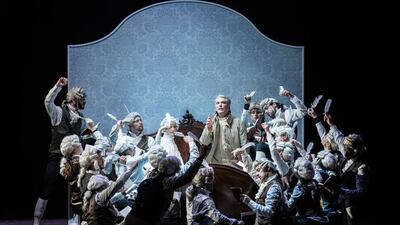The cast of real-life characters reimagined in Emirati composer Mohammed Fairouz’s second opera offers a mere glimpse of its ambition, complexity and relevance.
Osama bin Laden, Hillary Clinton, Mohammed Morsi, Henry Kissinger, Adolf Hitler and Mao Zedong are some of the historical figures who share stage time in The New Prince, which will have its world premiere tomorrow, beginning a week-long run at Amsterdam's Dutch National Opera.
Taking in scenes from Tahrir Square to the White House, the framing device for this modern meditation on power and revolution is Niccolò Machiavelli. The notorious Renaissance-era political philosopher is transported 500 years forward – from the publication of his political tract The Prince, to 2032 – and is called upon to bring its contents up to date. The libretto was written in English by celebrated American journalist and novelist, David Ignatius, and by any measure – size, scope and significance – The New Prince is one of the biggest productions to have its premiere this international opera season.
“Machiavelli had a really incredible, operatic life,” says Fairouz. “He happens to have been from Florence, which has an incredible operatic tradition, and he is a tragic figure and a deeply human figure.
“We decided really early on that we were not going to have people prancing about in Renaissance costumes in Florence for two hours.”
Instead, Machiavelli’s modern-day patron is president Wu Virtu, leader of an imagined meta-kingdom called Amerasiopia, which links the “tri-capitals” of Miami, Dubai and Shanghai (referred to in the opera as New Columbia). The inclusion of Dubai in this post-globalised trinity of influence was not coincidental. When linked to Abu Dhabi in minutes with the upcoming Hyperloop project, forming a single metro area, the emirate is poised, says Fairouz, to become the “central nexus of the new Renaissance”, at “the centre of a digitally reimagined silk road”.
Fairouz calls The New Prince a "geopolitical sci-fi" – but like all good science fiction, the imagined future is grounded in studied reality.
“I’m very interested in statecraft – the systemic issues in the world and how to solve them,” says the 31-year-old composer.
“That’s how this opera came about; it is a historical and ethical study of the current moment we are in, and it projects into the future – but not too far, within our lifetime.”
The son of an Emirati diplomat, Fairouz grew up across five continents and now lives in New York, but still proudly hails Dubai as his hometown. Despite his young age, The New Prince is just the latest dramatic high in Fairouz's celebrated career, which has included four symphonies, numerous song cycles, chamber works and previous opera Sumeida's Song.
Fairouz is also a columnist for numerous newspapers, including The National.
In Ignatius, Fairouz found not just a fitting intellectual interlocutor, but another fearless mind willing to take a leap of faith. An award-winning Washington Post columnist, regarded as one of America's foremost political commentators, Ignatius has written 10 novels – largely espionage thrillers – but had never considered penning an opera until he got Fairouz's call.
"I told [Mohammed] frankly that not only had I not written a libretto, but that I wasn't particularly an opera buff – I'd seen some operas, but I was far from an expert," remembers 66-year-old Ignatius. On Fairouz's advice, he sat down to Jacques Offenbach's Tales of Hoffmann, and became inspired by the use of three interwoven stories, sandwiched between a prologue and epilogue. This became the basis of the three key lessons Machiavelli learns from the 500 years of history he has missed. "There's a way opera does not just allow you to write about big ideas – it almost requires you to," adds Ignatius.
The first lesson, explains the writer, focuses on the theme of revolution, taking in passing appearances from Hitler and Mao, before moving to the recent successive political upheavals in Egypt.
The next zeros in on scandal and the politics of shame through the stories of Alexander Hamilton’s blackmail and Bill Clinton’s disgrace.
The final lesson is a warning about the greatest threat facing today's world order, a post-September 11 ideological clash of civilisations, and climaxes with Osama bin Laden and Dick Cheney singing in unison. Kissinger, meanwhile, is employed throughout as a contemporary counterpoint, the "modern-day epitaph of Machiavelli's ideas", says Ignatius. Bringing such a roll call to the stage might sound engineered to generate headlines. Yet it is intriguing to learn that an early title for the opera was Fear and Love – two key themes of the opera, says Fairouz.
Moreover, many of the words which come from these historical figures are quoted verbatim from recorded speeches. “Kicking up dust is crude,” adds the composer.
"The idea is not to create controversy or raise eyebrows – drama has to be about stakes, and by setting [The New Prince] in the future, it creates a personal investment – because this is the home we live in – it is either going to burn down or succeed.
“If we don’t break the cycle of historical abuse that we’ve been immersed in since time immemorial – the stakes are so high – we’re talking about the destruction of the world, the very glue of life being torn apart.”
• For more details, go to www.operaballet.nl/en/opera/2016-2017/show/new-prince
rgarratt@thenational.ae

